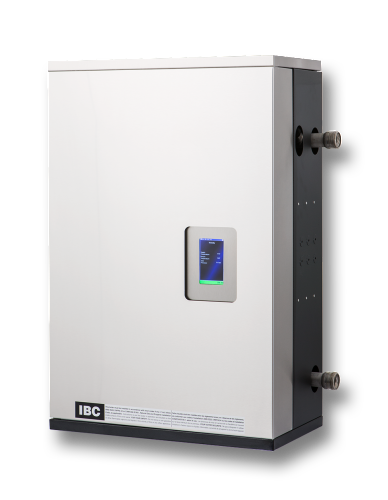
We provide boiler installation services to residential and commercial customers in Toronto and the GTA. Boilers are still widely used as the heating source for many Toronto and GTA homes. They are versatile, multi-functional and efficient heating sources. Boilers do have a long service life, however when aging boilers begin to give you trouble repairs can often become costly. Upgrading to a new modern boiler has many benefits.
Air Purification is the process by which we remove, destroy or render harmless bio-aerosols and volatile organic compounds in the air we breathe. Filters are mostly used to remove inert particulate from the air stream. Unfortunately, this accounts for on average only 35% of our indoor air quality problem. Microscopic gases and bio-aerosols are the real danger and can only be addressed by other means. Air purification is the single most important defense in reducing harmful contaminants within our homes and places of work, especially in the absence of any outside air exchange.
Age of Your Boiler The life span of a boiler is typically 15 to 20 years. Take a moment to determine the age of your boiler. If it's pushing its life expectancy, you may want to think about a new boiler installation before your current one fails you. By taking this pre-emptive measure, you can take the time to investigate which boiler is best for your home and financially plan for this new investment.
Have you noticed your monthly heating bill rising over the past few months or even years? If so, the problem may stem from an inefficient boiler. Due to old age or damages, your boiler may be working harder than necessary to heat your home and water. With a new boiler installation, you get models built with new technology and energy efficiency in mind to save you money on your monthly bills.
How often in the past few years have you paid for a boiler repair? The number of repairs required by your boiler, especially in a span of two years, can be a top indication that your boiler is on its way out. Boiler repair can be costly and reoccurring problems can really begin to add up. When these repairs are projected to cost almost as much as a brand new boiler, it may be time to consider the value of investing in a new boiler installation.
Boiler effectiveness is key when deciding whether to replace the one you have for a new boiler installation. If you find that some parts of your home are too cold while others are too hot, it may be that your boiler is failing to distribute the heat properly. Although still technically providing heat, your boiler is not fulfilling its purpose efficiently.
A noisy boiler is never a good sign and if you frequently hear it emitting a rattling tune, a servicing may be due. Squealing or thumping noises could indicate that something is wrong with the internal parts, pre-emptive of an inconvenient breakdown. This may be a sign that you are due for a new boiler installation.
Boiler Technology has progressed a long way and practical uses for boilers have dramatically changed over the years. Boilers are being installed in newer homes more often to run in floor heating systems, snow and ice melting systems, hydronic forced air systems, and yes, even new modern radiators. Many new home designs are preferring a more open concept with high symmetrical ceilings where large duct bulk heads just wont work. Many older and even century old homes rely solely on a boiler for heating their cast-iron radiators and baseboard radiators.
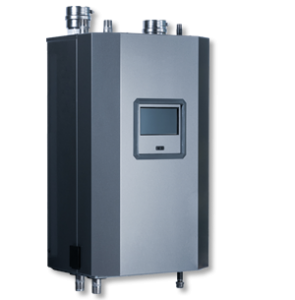
FITS ANY SIZE SYSTEM
Wall mounted boilers have become the industry standard. They are preferred as they require less space for installation. Wall mounted boilers are much lighter and easier to install as they have a smaller mass and stainless steel construction. They offer greater flexibility with plumbing connections allowing for a tidier installation. They have a wide range output that can suite any heating load. These boilers can be installed in a cascade format where multiple units are connected together for high BTU output or redundancy.
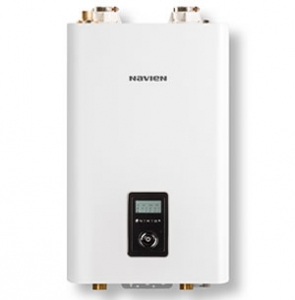
DUAL PURPOSE SPACE SAVER
Combi boilers are the ultimate space-saver. They are wall-hung and everything they need is contained within the unit itself. Unlike conventional boilers which require external tanks to supply your home with domestic hot water, you can stop renting that old water tank which helps save money. Ideal for small to medium size homes with up to 3 showers or anywhere space is at a premium. They produce on-demand hot water with little to no storage of water at all. New models now produce up to 200,000 BTU of space heating output for larger radiant systems.
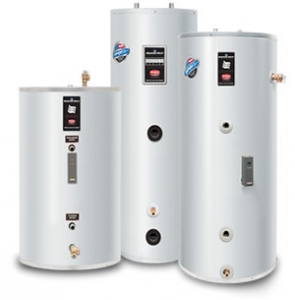
GREAT FOR SMALL SYSTEMS
Combi core units provide space heating and domestic hot water like a combi boiler. These are water tanks with large heat exchangers. Do not mistake them for a standard water tank. They are far more robust, insulated and designed for their task at hand, standard tanks are not. They are perfect for lighter duty applications such as small infloor loops and/or hydronic fan coils. Relatively lower in cost a typical use case is for homes with just the basement slab warmed and perhaps other small loops like the foyer. This is popular with homes underpinning.
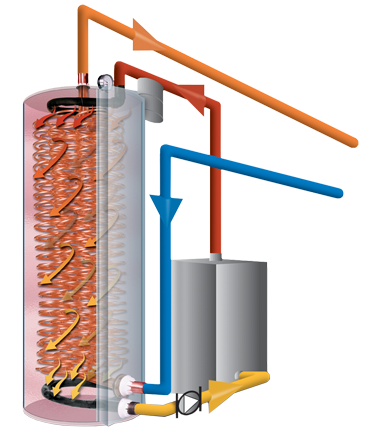
In order to understand what indirect and buffer tanks are used for you first need to understand the difference between the two, and how each of these components work.
Indirect or storage tanks do not produce their own heat; instead they rely on the boiler. In a typical arrangement, a closed-loop water pipe connects the boiler to the indirect water heater which feeds heated water to it. Though the boiler-fired water never mixes with the water in the storage tank, it circulates through the coils in the heat exchanger which heats the water for household use. In essence, the boiler does all the work while the indirect heater merely facilitates the transfer of heat. Because indirect tanks are very well insulated they maintain the water temperature long creating efficiency. They are just as efficient as your boiler. Boilers can produce substantial amounts of heat where as indirect tanks can in-turn produce substantial amounts of domestic hot water. It can produce enough to satisfy even the most demanding home or business.
The primary application for buffer tanks are to reduce what's referred to as "low-mass modulating condensing boiler short cycling". In simple terms this will save energy as the boiler runs less frequent cycles, overall generating greater comfort for a lower energy cost. Creating a greater thermal mass or buffer between heating loops where multiple small micro zones are installed will allow the system to distribute heat more evenly. Boilers may produce more heat than needed for any one single zone. This will cause the loop to over heat creating uneven temperatures and poor system performance. Buffer tanks solve that issue.
Copyright 2023 Imperial Energy | All Rights Reserved
Powered by Imperial Energy